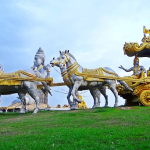We are doing a scripture study together: reading along through some scriptures and discussing the passages. Today is the seventh post of my favorite Upanishad: The Katha. This is the story of a boy who chatted with the God of death.
Part Two
http://www.angelfire.com/electronic/awakening101/upani_katha.html
Chapter I
1
Yama said: The self—existent Supreme Lord inflicted an injury upon the sense—organs in creating them with outgoing tendencies; therefore a man perceives only outer objects with them and not the inner Self. But a calm person, wishing for Immortality, beholds the inner Self with his eyes closed.
2
Children pursue outer pleasures and fall into the net of widespread death; but calm souls, having known what is unshakable Immortality, do not covet any uncertain thing in this world.
3
It is through Atman that one knows form, taste, smell, sounds, touches and carnal pleasures. Is there anything that remains unknown to Atman? This, verily, is That.
4
It is through Atman that one perceives all objects in sleep or in the waking state. Having realised the vast, all—pervading Atman, the calm soul does not grieve.
5
He who knows the individual soul, the experiencer of the fruits of action, as Atman, always near and the Lord of the past and the future, will not conceal himself from others. This, verily, is That.
http://www.vedarahasya.net/katha-4.htm
Parameshwaran (the Lord) has created the sense organs with a basic interest for material objects. Hence, the man sees only the outward appearances alone (also that he sees only outside himself and not within himself). Rarely a wise man who aspires for liberation controls his mind, concentrates inward and sees the Supreme Soul inside (himself).
The idiots and the unwise run after the worldly objects and the material desires. And they fall into the death trap that is wide open. Contrarily, the wise men get to understand the immortal one (through rigorous meditation and concentration). Knowing fully well that there is nothing stable in this transient world, they do not run after anything like the others.
The intellect with which a man enjoys the various objects of his desire in the forms of sound, feel, vision, taste and smell is the one which is also capable of going beyond all such worldly objects and distinguishing them from the immortal. What is there that is beyond such intellect (or the knowledge)? This is that (this intellect or knowledge itself is that Atma or the Supreme Soul).
Having understood that huge and all pervading Atma (the Soul) by means of which one is able to see that within dream and reality, the wise one gets rid of all sorrows.
That one who recognizes the Atma, which is residing very close to oneself in the form of Jiva drinking the honey (which is the result of the deeds performed earlier), and which is the master for all those which came and went, he does not worry about saving himself (since there will be no fear or joy as he identifies himself with everything else). That is that state which we are contemplating about (the state of no fear – arising out of knowledge of the Self).
Commentary (Swami Krishnananda)
This section one of chapter two describes in more detail the intricacies of the inner way of the Spirit and proclaims that until the Supreme Reality is reached, man is not going to have any peace. All efforts in whatever direction are a failure, and all wealth and fame in all the worlds will pale away if this Supreme Being is not realised. Everything shall flee and perish without giving the least comfort if you try to acquire, possess or enjoy it without a knowledge of this Reality. The worth of all things lies in It alone…
“The original Creator inflicted the senses to go outwardly, so everyone looks externally. Desiring immortality, not satisfied in this world, some wise man turns within, self-controlled and heroic.” We do not behold the Atman because of the original difficulty that seems to be sympathetically working everywhere; a tendency being set at work at the beginning of creation: to gaze outward. All creation is doing so…
The consciousness that gets attached to objects is death. When the object dies, consciousness, too, seems to die because of its identification with the former, though it never dies. All affections are of this nature. If the object with which we are identified fails, as everything has to fail, consciousness also fails and gets extinguished, and that is called death…
Death is a blessing, an eye-opener. Otherwise, we would remain ever bound to this body because we are so much attached to it…
The objects are nooses of Yama, and whoever goes to them is caught, like fishes get caught in a net cast out in the ocean. Die we shall, if we go near objects!…
What is the Atman? This is the Atman: “That which is not the object that is seen, but That which sees the object.” Try to differentiate between the object that is seen and That which sees.
My Thoughts
These free translations can be a little clunky. There are much clearer and more poetic translations available, but not usually for free!
The translation Swami gives for the first verse makes much more sense to me than the other two! “The original Creator inflicted the senses to go outwardly, so everyone looks externally. Desiring immortality, not satisfied in this world, some wise man turns within, self-controlled and heroic.” That sounds more like the verse I grew up hearing.
















